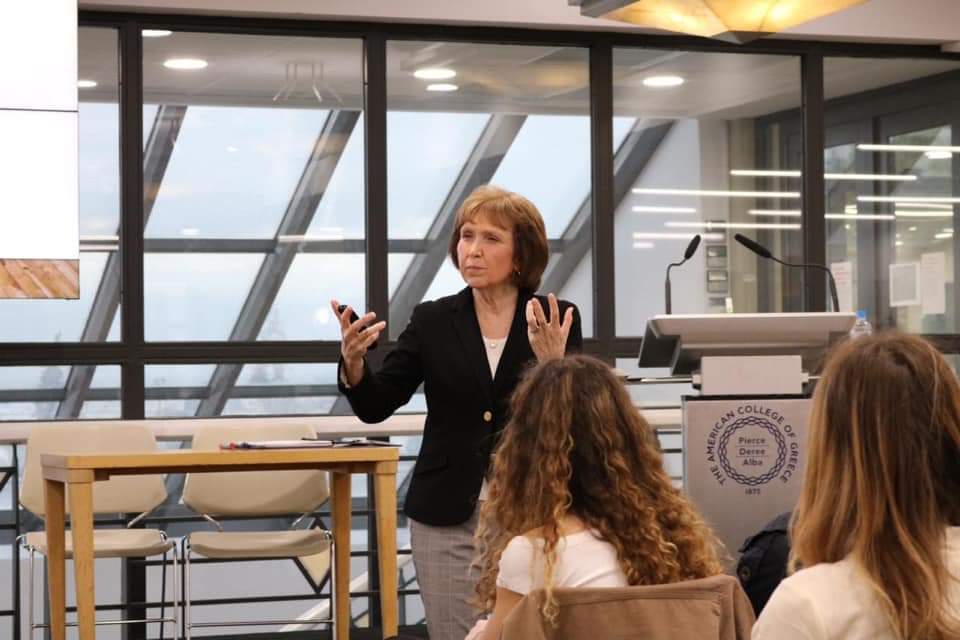Dr. Mary Lou Frank is a licensed psychologist and mediator with a Ph.D. in Psychology from Colorado State University. Having completed a training in Advanced Negotiations for Executives at Harvard University, she has been serving as a state approved neutral for the courts in Georgia. As a devoted mediation trainer for graduates, law students, and young leaders throughout the world, she has various publications to her credit. Here is her interview with Desi Kaanoon.
Q. How has your experience training law students in Mediation been?
A. First, thank you for asking, it is a pleasure to have the opportunity to contribute to your good work.
My experience in training law students has been very positive. I have had opportunities to train over Zoom as well as in-person in the states and internationally. Most recently, we trained 58 teams of students from ten countries at the International Law School Tournament at Loyola Law School in Chicago. However, my husband and I were fortunate to be asked to train lawyers in Białystok, Poland and then law students at a tournament from across Europe. We have provided training in Turkey, Poland, Ukraine, and Canada. Law students are the future leaders and I am humbled to help them in learning alternative ways to handle conflict. Much of my work has been in the area of training students in transformative mediation. In this format, the focus includes not only helping the parties resolve the issues but moreover helping individuals learn how to heal the relationship. We have been providing this training for close to twenty years.
Q. Having completed training in Advanced Negotiations for Executives from Harvard University, what nuances of Negotiation still prove to be quite helpful to you?
A. As a licensed psychologist, negotiation training helped me understand some of the issues that can keep parties from a settlement in a legal setting. Understanding and respecting the cultural backgrounds and perspectives of the individuals involved remains the most important in working with parties regardless of the context.
Q. As the current President of the International Academy of Dispute Resolution, what challenges do you encounter?
A. It has been an honor to serve as President for the past two years. When I reflect on this time, my focus is on what we as a team have accomplished together. We began by revisioning our mission, which is “is to build, through education, world-wide recognition of the power of dispute resolution processes to peacefully resolve conflicts and promote conciliation and healing.” We have become more focused as an organization, expanded our international programs and partners, and developed best practices for training and offering tournaments. We are now working on offering Zoom tournaments. Any challenges were worked through at the Executive Committee and that group of mediation professionals has continued to maintain quality as well as provide more opportunities for students to participate.
Q. Your textbook “The Mind of a Peacemaker: The Psychology of Mediation,” happens to be the first book on mediation written from the psychological viewpoint. What role do you think does the study of Psychology play in molding a successful mediator?
A. Research in psychology can help mediators be more effective. Reviewing the studies that have shown the importance of everything from how we approach a mediation session, how we address emotions and bring mindfulness to the process, how we attend and listen, to how we bring the parties together that are in conflict. Understanding the impact, we as mediators have is critical in many ways. Just as psychologists themselves are a key part of the healing that happens in therapy, mediators and what they bring personally, are critical to the change process that happens in mediation. Ken Cloke wrote the Foreword to the second edition of my text and his belief also is that psychology provides information about the process that is invaluable to mediators.
Q. Are there any LL.M. courses in Mediation that law graduates can pursue from universities in the US to become a qualified mediator?
A. Becoming a qualified, certified mediator in the states, requires that individuals meet state requirements. However, a number of excellent Law Schools offer LL.M. programs that are focused on mediation. These include (to name a few): Pepperdine University School of Law, Ohio State University Moritz College of Law, University of Missouri-Columbia School of Law, Mitchell Hamline School of Law, Benjamin N. Cardoza School of Law, University of Oregon School of Law, and the University of Southern California. Each of these offer LLM degrees in ADR. The Loyola Law Schools have strong Mediation and Conflict Resolution Centers and courses for students also. Loyola Law School in Chicago is the host for Law School Tournaments we offer in the US.
INADR also provides advanced mediation training in conjunction with each of our tournaments.



